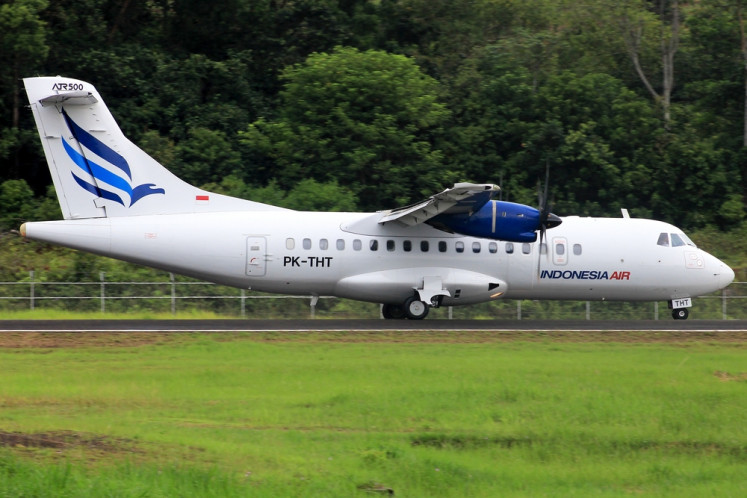Popular Reads
Top Results
Can't find what you're looking for?
View all search resultsPopular Reads
Top Results
Can't find what you're looking for?
View all search resultsWith doctors only one chat away, telemedicine on rise in RI
Visiting a doctor used to be burdensome
Change text size
Gift Premium Articles
to Anyone
Visiting a doctor used to be burdensome. Those feeling under the weather had to make a trip to a clinic or hospital and wait their turn for a consultation, and then wait around again at the pharmacy for their prescribed medicine.
But now, with the growing practice of telemedicine, sick days have become easier as meeting doctors, access to medicine and other healthcare-related services are only one chat away.
From her bedroom in Malang, East Java, Radhya Melkah, 21, decided to use Halodoc, a healthcare platform, for the first time.
The college student had been having trouble sleeping and felt depressed. She scrolled down the app and found that there were several clinical psychologists she could choose from. The app showed all necessary information about the doctors — their photos, years of medical experience, academic background, consultation fee and availability.
While a doctor’s consultation can cost hundreds of thousands of rupiah, rates offered by the doctors on the app were lower than Rp 100,000 (US$7.33). Chatting with a doctor for less than half an hour, Radhya described everything that had been bothering her.
“The doctor did not prescribe me any medicine, but instead I was asked to have a positive self-talk with myself in the morning and before I go to bed. I feel so much better now,” Radhya told The Jakarta Post on Thursday.
She only paid Rp 15,000 for the consultation.
“It is affordable and cashless. [The app] can also deliver medicine to us,” she said.
In a country where doctors and facilities are not well distributed and geographically challenged, healthcare access has always been a problem.
The Health Ministry recorded that the number of medical school graduates was significant, reaching 12,000 last year. But they mostly work in big cities such as Jakarta and Medan, North Sumatra. Kalimantan and eastern provinces like East Nusa Tenggara and Papua are deprived of doctors.
The ministry has calculated that the ideal ratio for each province is one doctor for every 2,500 people. Only 11 out of 34 provinces, including Yogyakarta and Jakarta, meet the criteria.
The emergence of telemedicine in the country has brought hope that health services can cover more people.
A study conducted by DS Research in 2019 titled The Wellness Market Understanding, involving 600 respondents in Jakarta, found that there was an increasing understanding of digital apps in the health sector among urban people.
Halodoc was the most popular telemedicine app with 45.3 percent of respondents saying they had used the app, followed by Alodokter at 32.3 percent and Klikdokter at 18.8 percent.
“Simplicity was what respondents loved the most about the apps they used. Besides that, they also love how the apps give information about the product and service price,” the study said.
Halodoc chief executive officer Jonathan Sudharta said since the app launched in 2016, the business had continued to grow. Halodoc works with more than 20,000 doctors and has more than 9 million monthly active users.
“It is about [shaping] people’s behavior. When the behavior is established, people will continue with it,” he told the Post.
Adrianus Darmawan, 26, who works and lives in Yogyakarta, recently used the app to consult about his diet and condition after experiencing vertigo last week. Let alone finding the nearest clinic, it was hard for him to even walk.
“I woke up with horrible vertigo and [the app] really helped me. It provided a fast response and the doctor’s explanation was really clear and concise. The app is suitable for an urgent case like mine but also in a case that is not serious enough to warrant a hospital visit,” Adrianus said.
Despite being hailed by many, questions are being raised over safety. Like most online service providers in Indonesia, there is still no regulation on telemedicine in the country.
“Telemedicine is not yet regulated. It is even a legal violation because according to the health and medical practice laws, doctors who examine patients have to examine them directly, to see the patients’ physical condition,” Indonesian Consumers Foundation chairman Tulus Abadi told the Post.
“The digital age is inevitable. With the growth of the digital era, I think the two laws must be revised immediately. The government together with medical profession organizations must find the ideal form of telemedicine for both parties,” he said.
James Allan Rarung, the chairman of the United Indonesia Doctor Association, said that telemedicine cannot work for every health issue. Physicians often need to physically examine patients.
“There are mild illnesses such as influenza that can be consulted through text, but not everything is like that. Serious illnesses require a thorough examination and laboratory tests. In more serious cases, no conclusion and diagnostic can be drawn from a text-based consultation,” Allan said.
Allan also said telemedicine apps must clearly show a doctors’ registration certificate and practice license.
“This information must be on the app. If the app cannot show that information, then it’s illegal,” he said.
Responding to the concerns, Jonathan said his company was careful in accepting doctors.










